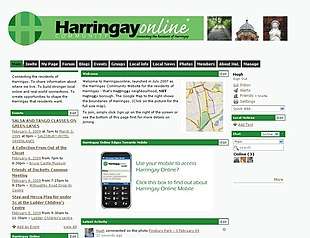Harringay Online
Harringay Online is a hyperlocal social network based in the neighbourhood of Harringay, north London.
| Part of a series on |
| Harringay |
|---|
| History |
| Locations |
| Other |
|
History

Started on 1 July 2007, Harringay Online was one of the first neighbourhood websites to be set up using social media technology.[1] It was established with the stated aim of strengthening the community in the neighbourhood of Harringay in the north London Borough of Haringey. The site aims to achieve a blend of web-based and real world neighbourhood interactions.[2]
Harringay Online explains its aims as achieving four main outcomes:[2][3]
- Building a sense of place in a neighbourhood – an understanding and appreciation of the neighbourhood to encourage a feeling of belonging and regarding a place as home.
- Building social capital in the neighbourhood – building networks, norms and trust that enable people to act together more effectively to pursue shared objectives – simply put building community spirit or neighbourliness.
- Empowering local people to take action to shape their neighbourhood – working to improve local people’s ability to influence local decisions and affect local circumstances.
- Engaging people in local democratic processes.
The site's main structure is:[2]
- Main Page - summarising and linking to all content.
- Forum - for discussions on local and sometimes non-local issues.
- Blogs - for blog type pieces.
- Gallery - pictures & videos including an extensive series of film footage and photos on Harringay's history.
- Local Information - a wide range of local links and information including weekly updates.
- Events - calendar of local events.
- Local News - local news stories aggregated from around the internet.
The site is a well used local site and receives between 1500 and 3000 unique users per day.[2] An email update is circulated weekly to all members.[1]
Harringay Online is regularly referenced around the world as an exemplary, community-led, hyperlocal website, being referred to recently by Urban Initiatives as "the gold standard for community websites".[4] It has been recognised by two national awards and was awarded a Judge's Special Commendation by the Prime Minister in the UK's 2008 Catalyst Awards.[4] In June 2009 it was highly commended in the National eWell-Being Awards.[4]
In 2010 it was a focus for the UK-based study on local websites, the Online Neighnourhood Networks Study
With a stated target population of 22,500, by 2018, it had signed over 12,500 members.
References & notes
- Gibson, Andy (2010). Local By Social. NESTA.
- Azyan, Liz (2009). Exploring Online Neighbourhoods. LGEO Research.
- Joining the Conversation. Young Foundation, I&DEA, Local Government Association. 2010.
- Online Networked Neighbourhoods Study. Capital Ambition, London Councils. 2010.
- General
- Referenced in Joining the Conversation: a guide to neighbourhood media, a paper jointly published by the Young Foundation, IDeA and the Local Government Association.
- Section on Harringay Online in Promising Practices In Online Engagement by Public Agenda.
- Referenced in Making The Connection report from the Carnegie Trust
- In Local by Social publication by IDeA
- Harringay Online in the Online Neighbourhood Networks Study
- Harringay Online on BBC London News
- Harringay Online on BBC Technology
- In The Guardian Social media can help riot-hit communities recover
- Referenced in the Sydney Morning Herald Blueprint for future needs to address loneliness, says report
- Referenced in The Connected Community:Local Governments as Partners in Citizen Engagement and Community Building, Arizona State University (pp 80-85
- Harringay Online on the European Union's best practice website
- Harringay Online used by Smithsonian as an archive resource
- Harringay Online used as a reference source by the Library of Congress
- Referenced in NESTA's report on UK Hyperlocal media Here and Now